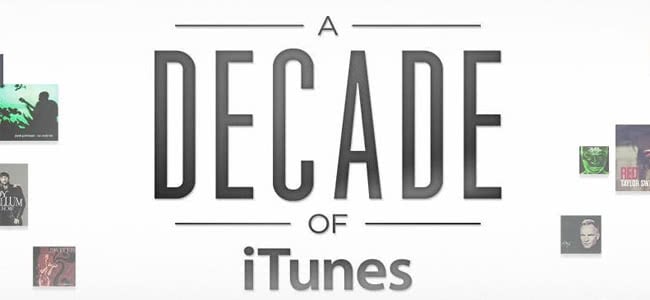Happy 10th birthday iTunes!
That’s right, the online superstar of the music retailing world celebrates it’s tenth anniversary this Sunday 28th April. It was 10 years ago that, in an age when piracy was rampant and only beginning to shake the foundations of the recording industry, Steve Jobs unveiled Apple’s newest and brightest toy: the iTunes store.
As music blogger Alan Cross notes, amid the buzz surrounding Peer 2 Peer enquiries and in the wake of the Napster incident, Jobs was able to come up with a way of getting music to consumers at a pace that was able to compete with illegal downloading services that was cheap and easy to use.
Beginning as a specifically U.S. based and Mac compatible piece of software initially created in order to further entice consumers into purchasing Apple hardware (a small mp3 device you may have heard of in particular; the iPod, anyone?), the iTunes store launched in 2003 with a catalogue of 200,000 songs all priced at 99c each.
It was two years after its American debut that the iTunes store finally arrived in Australia, and has become equally as popular here as in every other of its 119 territories. Oh how far ten years can take us.
As a part of the tenth birthday celebrations, Apple have released a ‘decade of iTunes’ pamphlet-style timeline of milestone events that have all equally contributed to the growing succes of the music store. It was 10 years ago that, in an age when piracy was rampant… Steve Jobs unveiled Apple’s newest and brightest toy: the iTunes store.
The timeline sees a series of ‘top selling’ and ‘100 millionth song downloaded’ milestones that include the top selling album on the iTunes store’s first day was Beck’s Sea Change, ‘Speed of Sound’ by Coldplay being the 1 billionth song downloaded on iTunes in 2006, and The Beatles’ entire back catalogue becoming available for purchase in November of 2010.
Despite the anti-iTunes stance that a few of the world’s biggest rock bands have had, including the previously mentioned Beatles and Led Zeppelin, those known to have once been sceptical of the entire idea of online musical downloads, but eventually caved.
As previously reported, AC/DC only submitted to iTunes in November of last year, they originally claimed that online music distribution was disrespectful to the physical formats of the past, but eventually came around and decided to release their entire catalogue on iTunes.
Other milestones in the iTunes store’s 10 year career include the introduction of the iTunes Festival in London in 2007 that featured the likes of Paul McCartney and Amy Winehouse, and as previously reported, reaching its 25 billionth download earlier this year. The song? ‘Monkey Drums (Goksel Vancin Remix)’ by Chase Buch, a DJ producer from London, purchased by Phillip Lüpke from Germany. And as the downloader of the 25 billionth song Apple decided to give Phillip an iTunes gift voucher to the tune of €10,000 (about AU$ 13,000). Regardless, if the last 10 years are anything to go by, Apple’s iTunes store looks set to continue being a household name…
Since it’s beginnings as a (relatively) humble online music retailer, the iTunes music store has since expanded its brand into including the sales of TV shows, films, apps, podcasts and ebooks. The power and momentum that the iTunes store initiated has been fast embraced by Apple to further extend their catalogue of hardware, now with a range of products that includes a host of iPod evolutions, laptops, iPads, and iPhones; all of which sit hand in hand with the iTunes store.
For now iTunes should be sitting pretty, with the Apple Insider nothing that the dominant digital retailer “now offers 35 million songs in 119 countries, 60,000 movies in 109 countries, and 1.7 million iBook titles.” While Alan Cross also reported that the store brought in $4.1 billion for Apple in the last quarter, (not a bad 10th birthday present, hey?).
It’s been generally smooth sailing for the music retail giant over the last ten years, with the store only encountering some serious competition and subsequent criticism in recent months over what the next phase of the iTunes store will include. With subscription-based music services such as Spotify and Deezer, as well as other retailers including Amazon and Netflix encroaching on their markets, iTunes have been developing their own radio-style streaming service in order to keep ahead of its competitors.
Itunes is getting ready to enter the next stage of its life, and as reported earlier this month, Apple is preparing to launch what has been previously referred to in their press as ‘iRadio’, but Apple have begun referring to it as the “new streaming service” in negotiations with Warner and Universal, which are apparently reaching their final stages.
This slight semantic change could mean a seismic shift from its plans to assert itself as primarily an online radio service, like Pandora.
Regardless, if the last 10 years are anything to go by, Apple’s iTunes store looks set to continue being a household name and an ingrained part of contemporary culture.

































